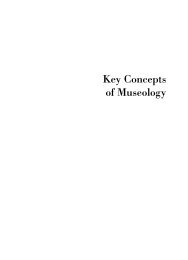ISS 25 (1995).pdf - The International Council of Museums
ISS 25 (1995).pdf - The International Council of Museums
ISS 25 (1995).pdf - The International Council of Museums
Create successful ePaper yourself
Turn your PDF publications into a flip-book with our unique Google optimized e-Paper software.
MUSEUMS AND COMMUNITIES: AN ECOLOGICAL APPROACH<br />
Nicola Ladkin<br />
Collections Manager - Anthropology<br />
Museum <strong>of</strong> Texas Tech University, Lubbock, Texas. 79409-3193 USA<br />
Museology is a branch <strong>of</strong> knowledge that is characterized by theoretical debate<br />
surrounding the various aspects <strong>of</strong> museum existence. Thus, it expands as a result <strong>of</strong><br />
investigation into areas <strong>of</strong> theoretics previously uncharted. While museological debate<br />
may not conform to scientific standards <strong>of</strong> testing and re-testing with predictable<br />
results, it emphasizes observation, critical thinking, analysis, and shifts in perceptual<br />
focus. <strong>The</strong>oretical subjects are based upon systematic, organized knowledge, that<br />
utilizes conceptual reasoning to develop principles and rules and beliefs that seek to<br />
explain a system. Some such explorations may prove fruitless while others may yield<br />
rich rewards.<br />
U museums are committed to building dynamic relationships with communities, they<br />
must also build the theoretical constructs that explain these relationships. Historically,<br />
museologists have examined their relationship with their communities from human and<br />
cultural perspectives. However, this approach ignores the fact that museums are part <strong>of</strong><br />
the much larger community that is the global, natural environment. It is theorised here<br />
that ecological concepts and models that explain the processes operating within the<br />
natural environment can be used to explain the processes operating within museums,<br />
wl).ere museums are seen as a species in that natural environment. This is illustrated<br />
through the application <strong>of</strong> accepted ecological concepts to museological examples,<br />
where community is synonymous with ecosystem. <strong>The</strong> ecological concepts used in this<br />
investigation are representative <strong>of</strong> the discipline, not exhaustive. <strong>The</strong> museological<br />
examples demonstrate the application the concepts, and these can be applied to any<br />
museum scenario.<br />
Museology can learn much from the ecological method <strong>of</strong> examining the relationship <strong>of</strong><br />
parts to a whole. Concepts such as carrying capacity, diverSity, and niche are well<br />
established within ecological literature and provide a holistic mechanism for<br />
understanding the interrelationships within complex systems. Cultural ecology<br />
examines the cultural, psychological, and anthropological aspects <strong>of</strong> the relationship<br />
between culture and the natural environment (Bennett, 1976). Political ecology<br />
57
















